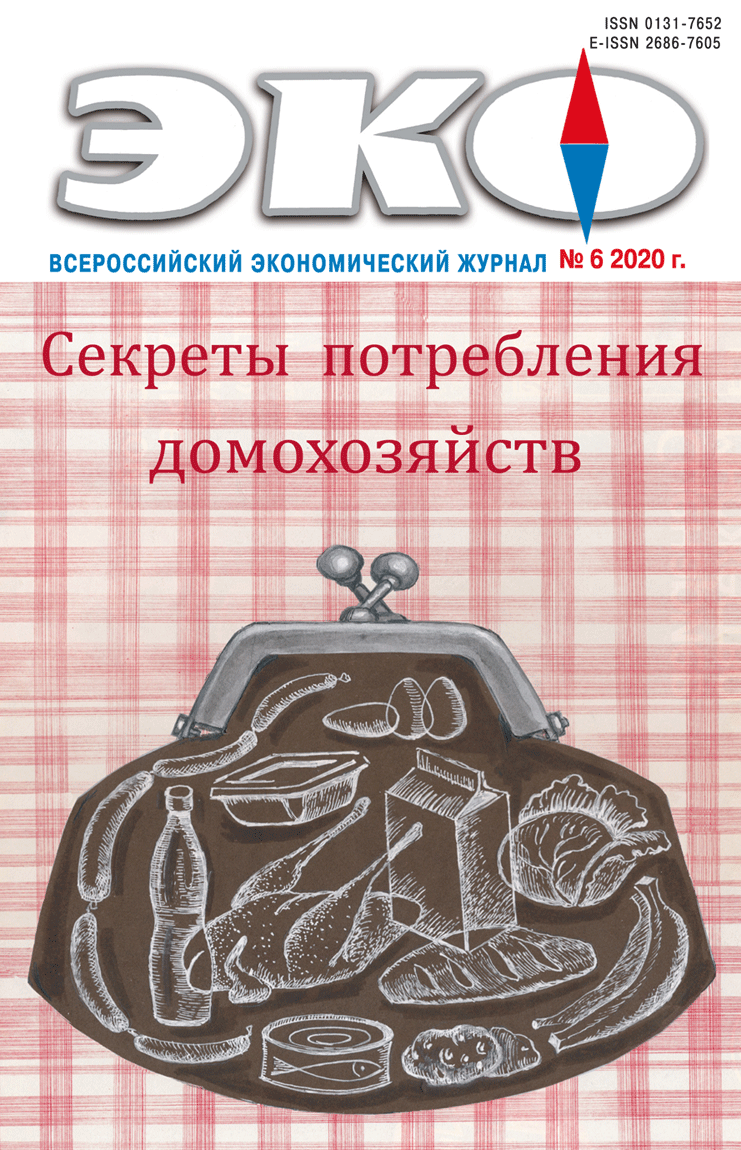Тема номера: Секреты потребления домохозяйств
Published 2020-06-01
Keywords
- cost of living,
- minimum wage,
- social guarantees,
- poverty in Russia,
- tax regulation
- infrastructure services,
- consumer basket ...More
How to Cite
1.
Korneychuk Б. Principles of Reforming the Russian Consumer Basket. ECO [Internet]. 2020 Jun. 1 [cited 2024 Sep. 26];50(6):48-66. Available from: https://ecotrends.ru/index.php/eco/article/view/4046
Abstract
The paper deals with the problem of reforming the Russian consumer basket in the light of its planned change in the beginning of 2021. The author puts forward a justified system of principles for its reform based on trends of post-industrial development, approaches for determining social guarantees in developed countries and consideration of changes that took place in the Russian social sphere over the last years. The research considered ways of forming the consumer basket, calculation of the minimum cost of living including a portion of established services as a share of existing consumer basket and the cost of minimal set of infrastructure services for an able-bodied citizen (for a St-Petersburg case). Based on the statistical data analysis, the author has shown that the main drawbacks of the current consumer basket is lower consumption of services and absence of obligatory payments and fees among its components, which lead to growing debt for housing and communal services and deeper poverty. The author proposes doubling the share of cost of services in the consumer basket and increasing the level of non-taxable income by the cost of living of an able-bodied person.References
- Вишневская Н. Т. Регионализация минимальных заработных плат // Вопросы государственного и муниципального управления. 2016. № 4. С. 27–44. URL: https://vgmu.hse.ru/2016–4/199077550.html. (дата обращения: 27.01.2020).
- Елизаров В. В., Синица А. Л. Бедность семей с детьми: проблемы определения и измерения, региональные особенности // Уровень жизни населения регионов России. 2018. № 2(208). С. 24–33. DOI: 10.24411/1999–9836–2018–10012.
- Железовская Л. А. Государственное регулирование в расширении потребительской корзины населения РФ // Эпоха науки. 2019. № 17. С. 32–36. DOI: 10.24411/2409–3203–2018–11708.
- Корнейчук Б. В. Оптимизация продуктовой корзины: взаимосвязь экономических и медицинских факторов // Экономическая политика. 2017. Т. 12. № 3. С. 236–257. Doi: 10.18288/1994–5124–2017–3–10.
- Литвинов В. А. Прожиточный минимум: история, методика, анализ. М.: URSS, 2010. 280 с.
- Лукьянова А. Л. Минимальная заработная плата и минимальные заработные платы в России // Журнал Новой Экономической Ассоциации. 2018. № 1(37). С. 176–186.
- Малева Т., Гришина Е. Каким должно быть детское пособие? // Экономическая политика. 2019. Т. 14. № 3. С. 54–69. DOI: 10.18288/1994–5124–2019–3–54–69.
- Роик В. Новая потребительская корзина // Социальное партнерство. 2006. № 2. URL: http://www.oilru.com/sp/11/ (дата обращения: 25.12.2019).
- Хайкин М. М. Сервисный капитал в контексте человеческого капитала // Известия СПбГЭУ. 2010. № 6. С. 7–15. URL: https://unecon.ru/izdaniya/zhurnal-izvestiya/archiv-nomerov (дата обращения: 27.01.2020).
- Anker R., Anker M. Living wages around the world: Manual for measurement. Edward Elgar Publishing. Cheltenham, UK. 2017. 379 p. DOI: 10.4337/9781786431462.
- Eldring L., Alsos K. European minimum wage: A Nordic outlook, Fafo-Report. 2012. No. 16. Oslo, Fafo. URL: http://www.fafo.no/pub/rapp/20243/20243.pdf (дата обращения: 25.12.2019).
- Leijten I. The right to minimum subsistence and property under ECHR: Never the twain shall meet? // European Journal of Social Security. 2019. Vol. 21. No. 4. Pp. 307–325. Doi: 10.1177/1388262719892466.
- Perekarenkova Yu.A., Kryshka V. I. Minimum wage and the subsistence level in Russian economy: Theoretical and Empirical analysis of the main trends // Economic and Social Changes: Facts, Trends, Forecast. 2019. Vol. 12. No. 2. Pp. 210–224. DOI: 10.15838/esc.2019.2.62.13.
- Ploszka A. The rights to subsistence minimum and its role in the protection of people living in extreme poverty. The Polish experience // Comparative Law Review. 2018. Vol. 24. Pp. 225–248. Doi: 10.12775/CLR.2018.19.
- Saracoglu O. F., Caskurlu E., Ejder H. L. Minimum subsistence allowance and family taxation: Examing of the efficiency comparison with some country experiences and Turkish case // Mediterranean Journal of Social Sciences. 2014. Vol. 5. No. 2. Pp. 525–533. DOI: 10.5901/mjss.2014.v5n2p525.

